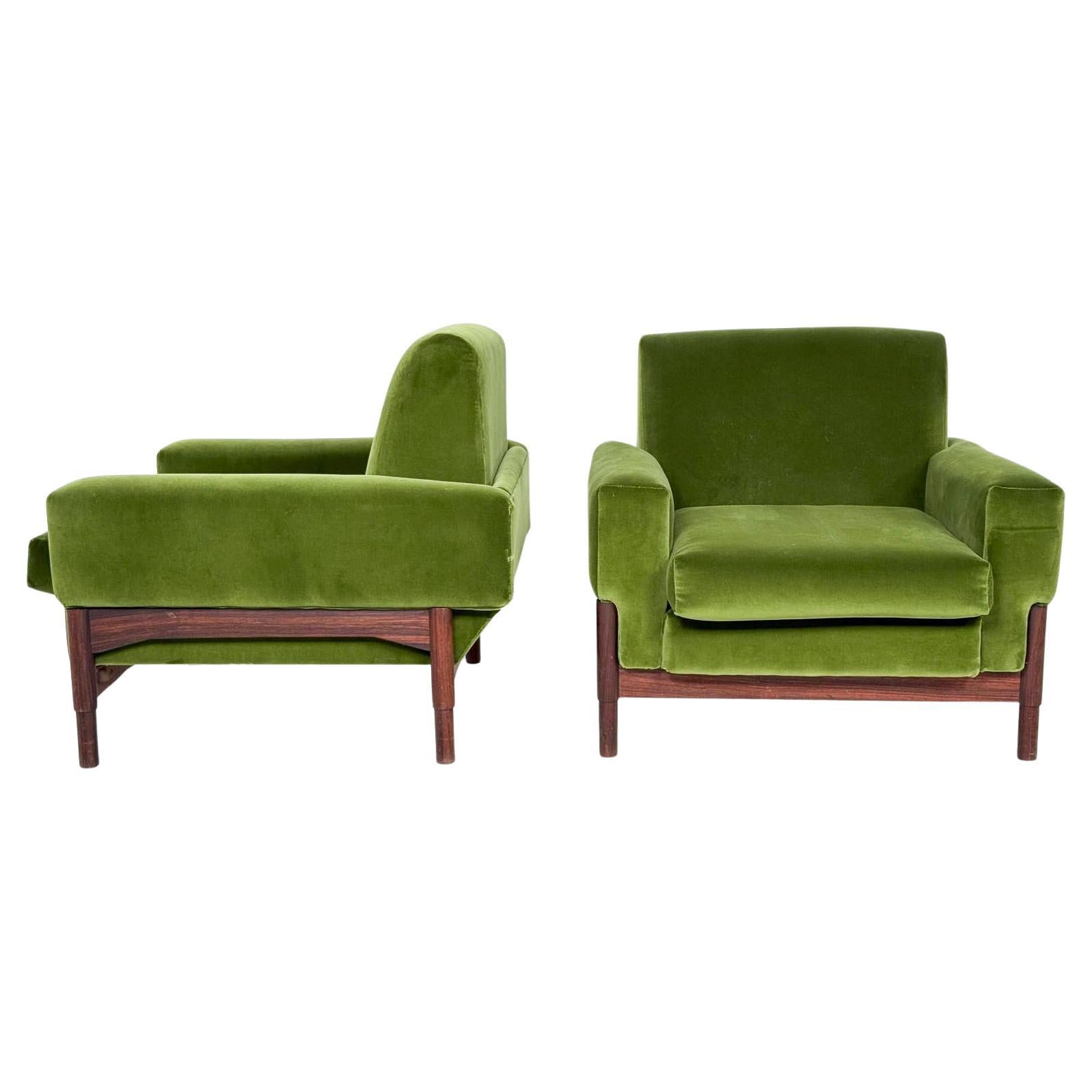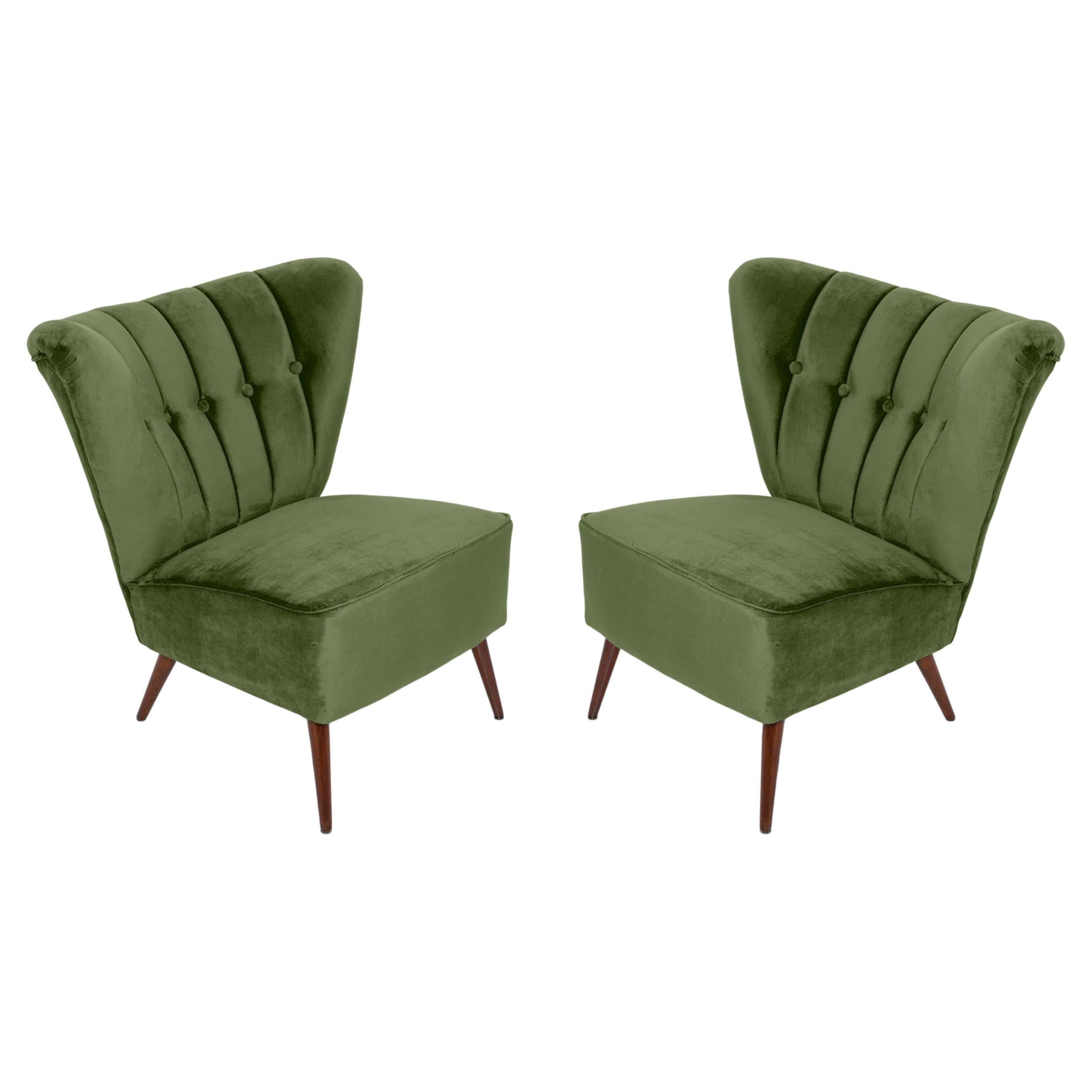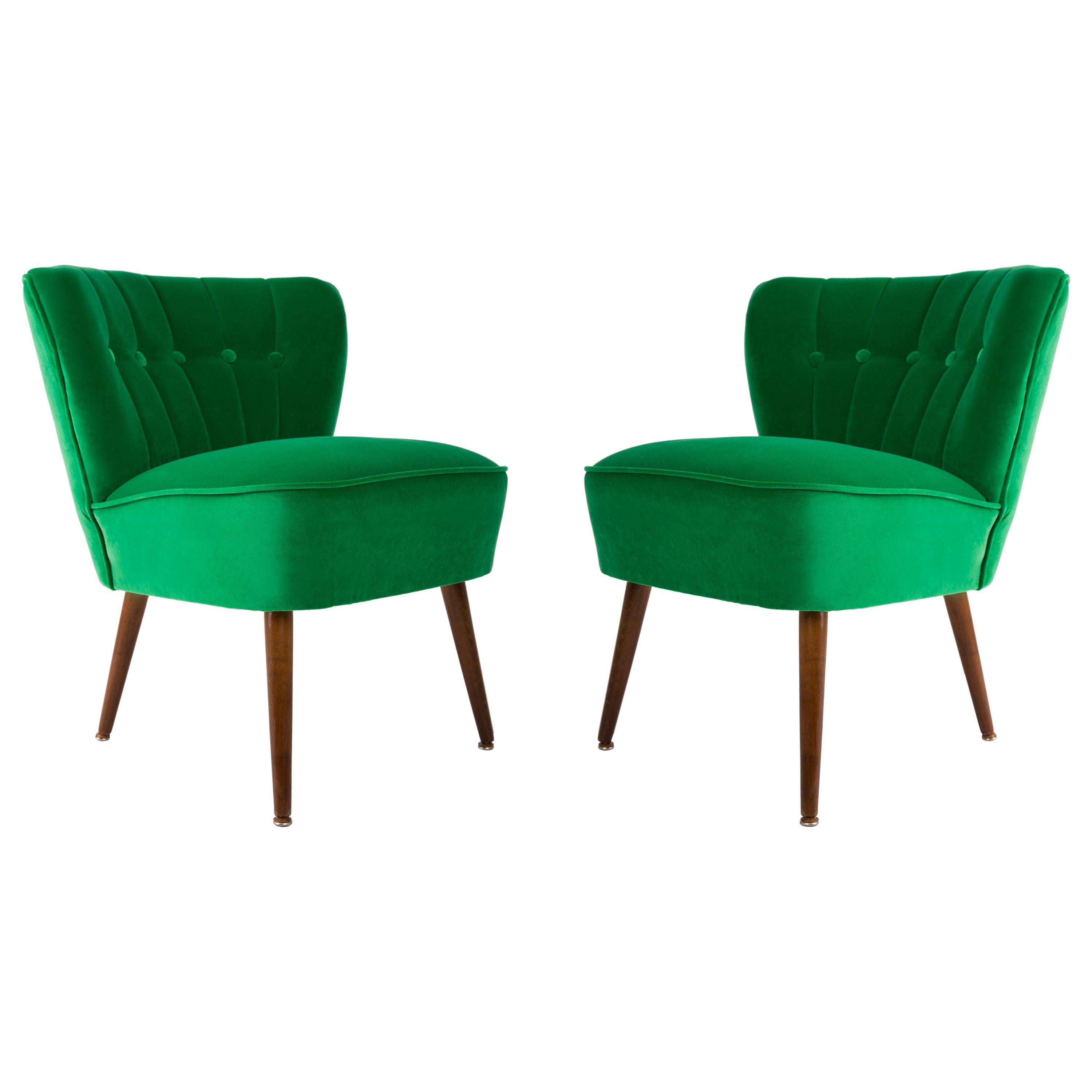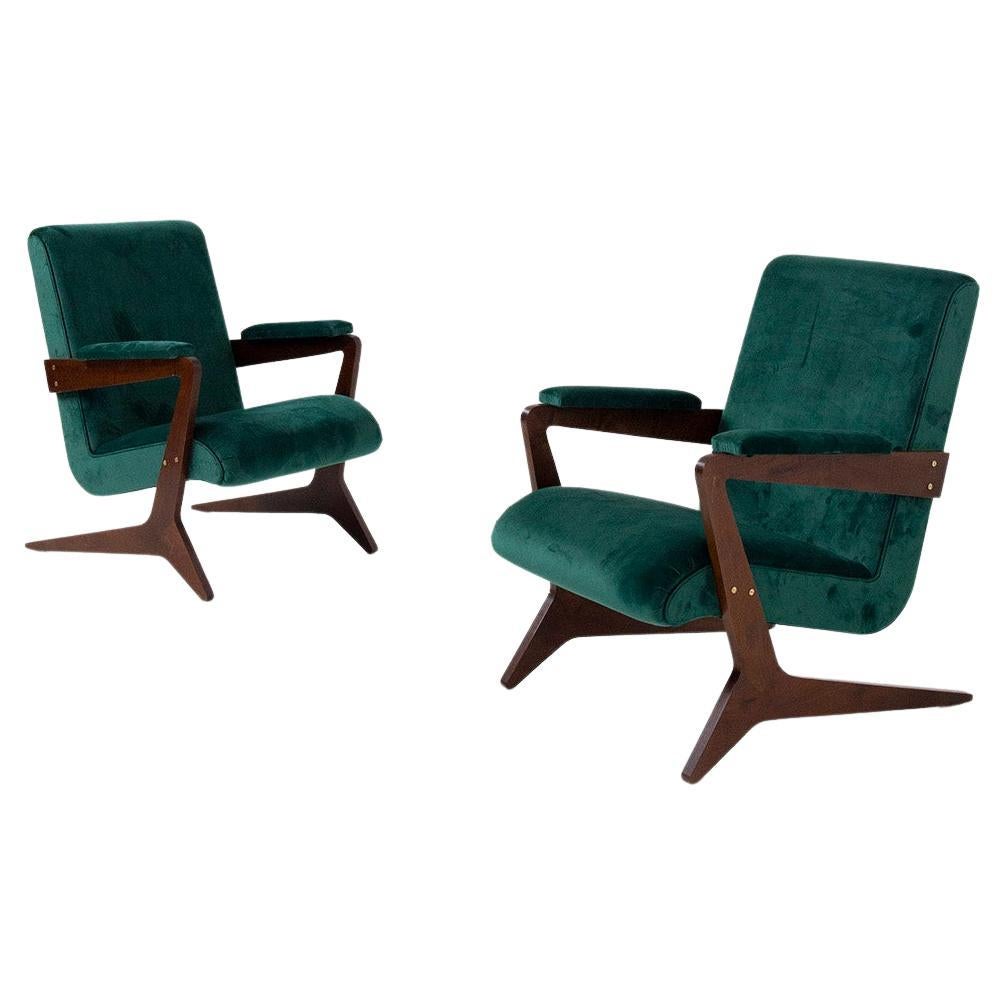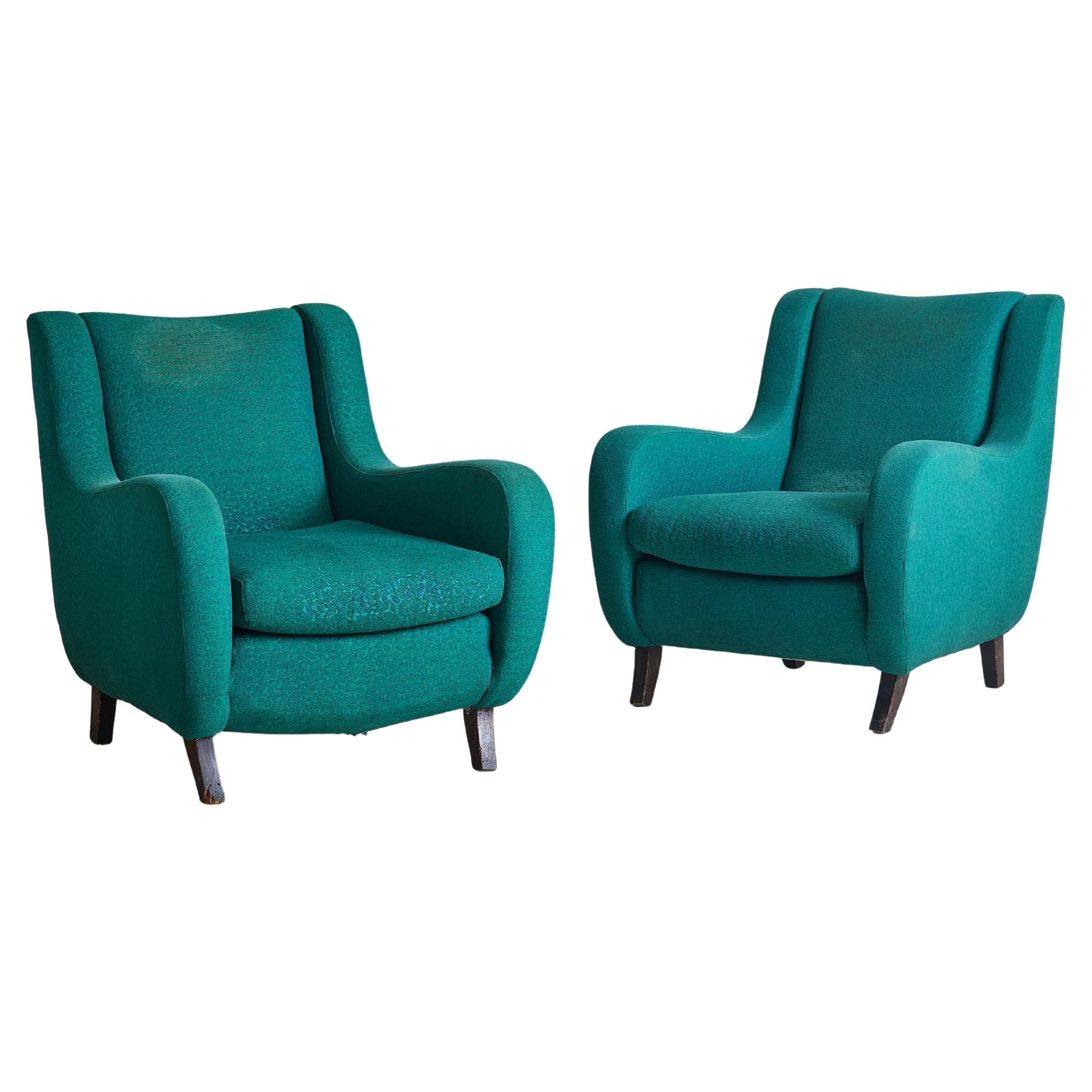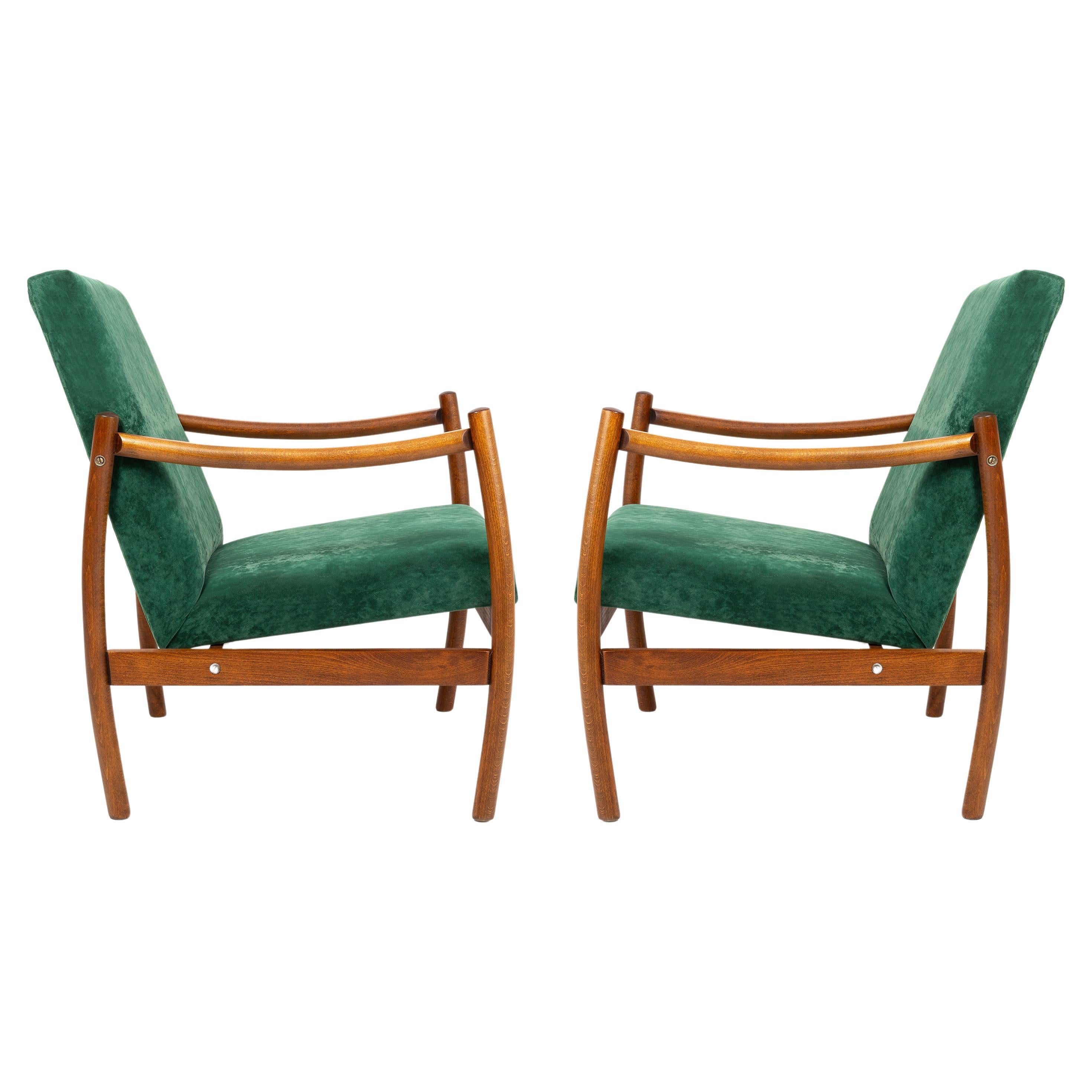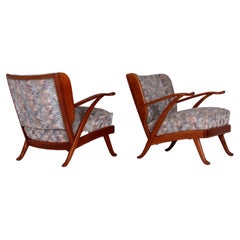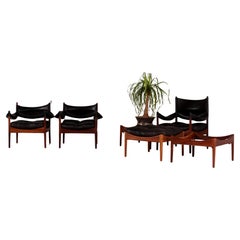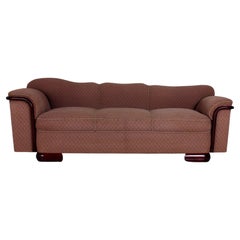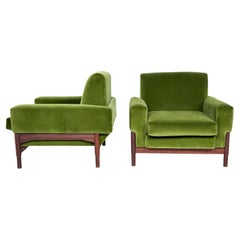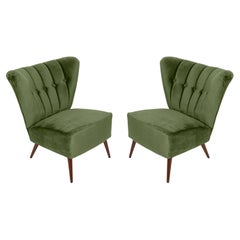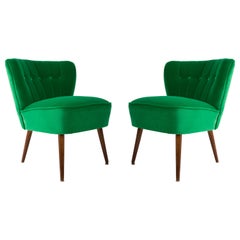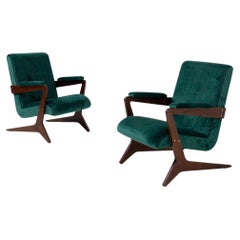Items Similar to pair of 1960s lounge chairs green velvet - beech WG solid make uph. easy chairs
Want more images or videos?
Request additional images or videos from the seller
1 of 16
pair of 1960s lounge chairs green velvet - beech WG solid make uph. easy chairs
$2,651.47per set
£1,964.71per set
€2,220per set
CA$3,667.87per set
A$4,042.25per set
CHF 2,116.25per set
MX$49,651.59per set
NOK 26,591.16per set
SEK 24,887.21per set
DKK 16,906.94per set
About the Item
This set of two West German lounge chairs is in very good condition
It was made in the mid 1960s
The armrests have been professionally restored (sanded - stained and lacquered twice in transparent silk)
we subject all our upholstered furniture to thorough cleaning with the latest Kärcher technology
Its solid wooden body is made of solid wood - the upholstery is in very good condition : firm and solid
It comes with its original velvet fabric in a exceptional and rare pleasing to the eye green colour.
What makes these lounge chairs special :: the unusual geometrically designed side parts !
Height max : 70 cm ~ Width max: 76 cm ~ Depth max:80 cm
Seating Height : 40cm ~ Seating Depth : 50cm ~ Seating Width : 55 cm
Weight: 18 Kg/each chair
Any more questions? Please feel free to ask.
English spoken ~ On parle français ~ parliamo l´Italiano ~ Wir sprechen Deutsch ~ y el Castellano también!
please also feel free to ask for a shipping quote by sending us your postcode
- Dimensions:Height: 27.56 in (70 cm)Width: 29.93 in (76 cm)Depth: 31.5 in (80 cm)Seat Height: 15.75 in (40 cm)
- Sold As:Set of 2
- Style:Mid-Century Modern (Of the Period)
- Materials and Techniques:
- Place of Origin:
- Period:
- Date of Manufacture:1962-1968
- Condition:
- Seller Location:Landshut, DE
- Reference Number:1stDibs: LU8587235729942
About the Seller
5.0
Vetted Professional Seller
Every seller passes strict standards for authenticity and reliability
1stDibs seller since 2023
21 sales on 1stDibs
- ShippingRetrieving quote...Shipping from: Bodenkirchen , Germany
- Return Policy
Authenticity Guarantee
In the unlikely event there’s an issue with an item’s authenticity, contact us within 1 year for a full refund. DetailsMoney-Back Guarantee
If your item is not as described, is damaged in transit, or does not arrive, contact us within 7 days for a full refund. Details24-Hour Cancellation
You have a 24-hour grace period in which to reconsider your purchase, with no questions asked.Vetted Professional Sellers
Our world-class sellers must adhere to strict standards for service and quality, maintaining the integrity of our listings.Price-Match Guarantee
If you find that a seller listed the same item for a lower price elsewhere, we’ll match it.Trusted Global Delivery
Our best-in-class carrier network provides specialized shipping options worldwide, including custom delivery.More From This Seller
View AllMidcentury set of 2 solid cherry wood wingback armchairs & sofa Karl Nothhelfer
Located in Landshut, BY
just beautiful
SET of Sofa & 2 Wingback Armchairs
by Prof. Karl Nothelfer - Designed in 1957
maker: Schörle & Gölz in Stuttgart - Bad Cannstatt
solid Cherry Wood
new upholstery and fabrics in 1998 according to last owner ( since then just in use for 2 years so upholstery is perfect ! )
Seatrests can be removed - and fixed by clips on belts
- high class -
measurements:
easy chair is 70cm wide ~ sofa is 178cm wide
both: seating height 40cm ~ seating depth: 57cm
condition - all firm and in very good condition - no damages
furniture have fully been accurately cleaned ::
- 3 steps: A: air pistol - B: industrial hoover - C: latest Kärcher "wash&hoover" technology
- woods have been polished several times
note: please ask for shipping quote by sending us your postcode/destination
Prof. Karl Nothelfer
* 14 June 1900 ~~ + 20 May 1980
Since the beginning of the 15th century, the Nothelfer family of carpenters has been continuously resident in the former
town of Überlingen without interruption. Every carpenter at that time mastered
all the possibilities of woodworking: so did the Nothelfer. They could carpenter,
even carve altars and figures, and set them in gold, silver and paint.
(churches in Owingen and Hödingen]. Some family members lived and worked
and worked in Hedingen or Hödingen,like today the jubilarian Karl Nothelfer (this in 1975).
His father, Karl Anton Nothelfer, as the eldest of seven siblings, was able to take over his father's carpentry business in Überlingen.
Karl Anton Nothelfer, the eldest of seven siblings, was unable to take over his father's carpentry business in Überlingen.
He instead moved to the industrial town of Singen with his young wife Rosalie, née Hanner, from the
from Hohenzollern in 1896 and moved to the former Poststraße and founded his own carpenter's workshop.
He had a highsense of quality and form and was already a member of the German Werkbund before 1914.
Karl Nothelfer and his three siblings grew up in such air.
After attending school and the secondary school in Singen, the young Karl learned the carpenter's trade in his father's workshop then moved on to the Badische Landes-Kunstschule in Karlsruhe,
where he studied architecture. At that time the well-known furniture professor also worked there
Fritz Spannagel, born in Freiburg in 1891, who settled in 1938 at Ittendorf Castle near Meers-
burg (died 1957). In 1928, the gifted young architect received a teaching assignment at the
at the Karlsruhe School of Art, but followed his teacher Spannagel to Berlin in the same year.
Berlin. Here he worked from 1928-1945 as a teacher - appointed professor in 1931 - at the
Berlin Tischler-Schule, the later Bauschule für Raumgestaltung.
The furniture he created in Berlin became internationally known through many exhibitions and lectures.
nationally known and influential. His furniture creations ushered in a new era in German and
a new era in German and European furniture design. At the world exhibition in Paris
1937 Prof. Nothelfer was awarded the Golden Medal for his work in the furniture sector.
for his work in the furniture sector. A first summary and balance of his work on furniture is given in his standard work
1942 published standard work "Das Sitzmöbel", the first compendium of its kind in the world.
world. In 1950 he published his second work "Furniture". Both books and a
series of brochures were published by Verlag Otto Maier, Ravensburg.
Karl Nothelfer continued to work intensively on the design of seating furniture in the years after 1945.
In 1950 he succeeded in the important invention of the two-legged skid-base chair, which has been
orthopedically - anatomically tested thousands of times - has become accepted all over the world today.
Even the most distinguished American furniture companies such as Miller or Knoll-International
use the skid as the main theme for desks and chairs. At the same time, N. had a groundbreaking
in the redesign of German school furniture and seating for industry.
industry. He succeeded in adapting his furniture forms, which originated in wood and handicraft, to the modern technical
modern technical possibilities of the industry. He thus became the great refor-
of schoolroom furnishings. The architect Nothelfer thinks about himself,
that he made his main contribution in the field of seating furniture, although this was not
was not really his profession.
After the war, Prof. Nothelfer, like so many others, had to start all over again. He settled
settled in his home town of Lake Constance in Hödingen in 1945 as a freelance architect and was
and was involved in all areas of construction in the years after the war. As early as 1935, he had given many
the example of American prefabricated buildings and recommended serial house
and recommended it at a time when no one in Germany was even thinking about mass production. Now he developed
he developed several types of mass-produced houses, which were manufactured in Baiersbronn.
of which more than 800 houses were built in France alone (types Paris, Provence, Normandie).
were built. At that time [1946], as part of the reparations in Strasbourg, there was an exhibition of houses with Swedish, Danish, and French designs.
with Swedish, Danish, Finnish, English and German houses, where the French occupation
for which 6 different types were sent from the French occupation zone, the
Nothelfer's house type was considered the top of this exhibition.
Karl Nothelfer was also involved in the development of chipboard. In 1946, together with others in Munich, he founded the first
magazine "Bauen und Wohnen" ("Building and Living") after the war and remained its co-editor for many years.
co-editor of this magazine for many years. By presenting his own work, he has here
interpreted what the essence of the magazine wanted to be: Building, in order to live in it, in order to live as a human being and humanly in the built. Karl Nothelfer planned his houses
furniture ground plan, from the need for living. In 1948 he was appointed honorary senator of the State Building
school in Holzminden.
Karl Nothelfer did not build much in Singen. The first post-war house was Haus
Fahr on the slope of the Hohentwiel (Domäne); the building material came from a demolished
log house that a French officer had built for himself on the Schie- nerberg.
nerberg. In 1952, he also built the administration building of the aluminum rolling mill in Singen.
rolling mills in Singen, with relief and wall painting by C. G. Becker. In Überlingen he built
In Überlingen he built, among others, the Buchinger Sanatorium, the Riese+ Hähnel radio house and
various reconstructions in the old town: Haus Kitt with the Glockenspiel, the Haus mit dem
Bacchus in the Überlingen village, the Dolphin Fountain in Hödingen (1975). Probably the most beautiful
Haus Nothelfers, the Haus Himmelheber, stands in Baiersbronn-Tonbach. On the airfield
Mengen, Nothhelfer built the casino building with the 30 square meter faience painting Ikarus by
C. G. Becker. In 1954 he founded a second office with architect Hans Schwingen in Düsseldorf.
Office, which primarily fertilized the housing construction, true to the motto:from the inside to
planning from the outside. The Minister of Housing awarded a prize to the best social housing in North Rhine-
Westphalia; it was from the Nothelfer+Schwingen studio in Düsseldorf. Also the idea of
new idea of home ownership was also promoted by Nothelfer+Schwingen.
promoted by Nothelfer+Schwingen. On the occasion of the red jubilee of the law about condominium ownership
Nothelfer gave a lecture in Essen in 1961 on condominium ownership in Europe (published as a brochure).
published as a brochure]. From Düsseldorf, among many others, in the silk city...
Category
Vintage 1950s German Mid-Century Modern Living Room Sets
Materials
Fabric, Cherry, Upholstery
MODUS by Kristian Solmer Vedel SET of 3 lounge chairs 1 stool & 2 coffee tables
By Kristian Solmer Vedel
Located in Landshut, BY
This set was designed by Kristian Solmer Vedel for the renowned Søren Willadsen Møbelfabrik in Denmark.
It boasts excellent original condition.
The set includes two lounge armchair...
Category
Vintage 1960s Danish Scandinavian Modern Stools
Materials
Aluminum
STRAIGHT classic art deco SOFA Dresden around 1930 or. fabric - wood refinished
Located in Landshut, BY
""~!~** STRAIGHT **~!~**
This classic art deco sofa was produced in the Dresden area in the 1930s
Its shape is quite unique and very well proportioned
Its spring upholstery is still strong and fully undamaged
All wooden parts have been demounted sanded and stained - then treated (sprayed) with a transparent Acrylic Silk Matt Paint
finish and professionally remounted.
The sofa has fully been accurately cleaned ::
:: 3 steps: A: air pistol...
Category
Vintage 1930s German Art Deco Sofas
Materials
Wood, Fabric, Beech
$3,633 Sale Price
33% Off
Carstens Tönnieshof German Floor Vase 60s 70s huge (50cms) cloud green glaze
By Carstens Tönnieshof
Located in Landshut, BY
HUGE FLOOR VASE
cloudy green glaze
Manufacturer CARSTENS TÖNNIESHOF
Design Period 1968 to 1978
Production Period 1968 to 1978
Country of Manufacture Germany
H / height: 52cm ~...
Category
Vintage 1970s German Mid-Century Modern Vases
Materials
Pottery
Italian BAR / COUNTER STOOL ~ TURQUOISE ~ 50s 60s Style Iron / Brass / Velvet
Located in Landshut, BY
Italian
TURQUOISE
BAR / COUNTER STOOL
TURQUOISE
1950s / 1960s style
Lacquered iron / Solid brass / Velvet / Upholstered
hq foam upholstered and kedered
Category
2010s Italian Mid-Century Modern Pedestals and Columns
Materials
Brass, Iron
a pair of 1950s Studio Keramik floor Vases Atelier Berta Huber Roethe Landshut
Located in Landshut, BY
an amazing set of 2 STUDIO KERAMIK FLOOR VASES
by Atelier Herta Huber Roethe Landshut 1950s
Manufacturer HUBER ROETHE
Design Period 1950 to 1959
Production Period 1950 to 1959
C...
Category
Vintage 1950s German Mid-Century Modern Vases
Materials
Pottery
You May Also Like
Mid-Century Modern Pair of Armchairs, Wood and Green Velvet, 1960s
Located in Brussels, BE
Mid-Century Modern Pair of Armchairs, Wood and Green Velvet, 1960s
Category
Mid-20th Century European Mid-Century Modern Armchairs
Materials
Velvet, Wood
Set of Two Mid-Century Green Velvet Club Armchairs, Europe, 1960s
Located in 05-080 Hornowek, PL
Springy, very comfortable and stabile club seats. Produced in the 1960s at the Karl Lindner factory in Germany. The whole armchair is covered with high-quality italian green velour (...
Category
Mid-20th Century German Mid-Century Modern Armchairs
Materials
Velvet, Beech
Set of Two Midcentury Green Velvet Club Armchairs, Germany, 1960s
Located in 05-080 Hornowek, PL
Springy, very comfortable and stabile polish club seat. Produced in the 1960s at the Karl Lindner factory in Germany. The whole armchairs is covered with high-quality green velour (c...
Category
Mid-20th Century German Mid-Century Modern Armchairs
Materials
Velvet, Beech
Pair of Brazilian green velvet armchairs, 20th century
Located in Milano, IT
ransport yourself to the vibrant heart of 20th-century Brazil with this captivating pair of Brazilian Geometric armchairs, an embodiment of modernity and geometric elegance. Crafted ...
Category
20th Century Brazilian Mid-Century Modern Armchairs
Materials
Velvet, Wood
$6,210 Sale Price / set
20% Off
Pair of Italian Lounge Chairs in Original Green Upholstery, 1960s
Located in Chicago, IL
A pair of 1960s Italian lounge chairs, embodying bold curves and refined craftsmanship. These chairs feature sinuous, sculptural lines and are upholstered in original vibrant teal fa...
Category
Vintage 1960s Italian Mid-Century Modern Lounge Chairs
Materials
Upholstery, Wood
Set of Two Mid-20th Century Vintage Armchairs, Dark Green Velvet, Europe, 1960s
Located in 05-080 Hornowek, PL
Armchairs produced in the 1960s by Radom Furniture Factories. Very comfortable seat covered with high quality fabric. The armchairs are fully carpentry and upholstery. Extremely comf...
Category
20th Century Polish Mid-Century Modern Armchairs
Materials
Velvet, Beech
More Ways To Browse
Vintage 1970s Ottoman
Vintage Bubble Chair
Vintage Cane Lounge Chairs
Vintage Sling Chair
Vintage Webbed Chairs
Vitsoe 620
Wim Rietveld For Gispen
1960 Tubular Chair
1960s Accent Chair
1960s Pine Lounge Chairs
1stdibs Chairs
After Gerrit Rietveld
Alf Svensson For Dux
Barcelona Ottoman Black
Bill Stephens For Knoll Chairs
Biomorphic Chair
Danish Bentwood Leather Chairs
Danish Glostrup Chairs
